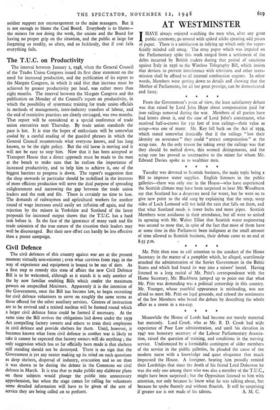The T.U.C. on Productivity
The interval between January I, 1948, when the General Council of the Trades Union Congress issued its first clear statement on the need for increased production, and the publication of its report to the Margate Congress, in which it said that that increase must be achieved by greater productivity per head, was rather more than eight months. The interval between the Margate Congress and the publication on Monday of the Council's report on productivity, in which the possibility of systematic training for trade union officials in methods of management, inter-industry transfers of labour, and the end of restrictive practices are clearly envisaged, was two months. That report will be considered at a special conference of trade union executives next Thursday. By trade union standards the pace is hot. It is true the hopes of enthusiasts will be somewhat cooled by a careful reading of the guarded phrases in which the General Council recommends what everyone knows, and has long known, to be the right policy. But the old horse is moving and it will not be easy to stop. him. Now that it has been accepted at Transport House that a direct approach must be made to the man at the bench to make sure that he realises the importance of increased productivity, and to help him to achieve it, one of the biggest barriers to progress is down. The report's suggestion that the shop stewards in particular should be mobilised in the interests of more efficient production will serve the dual purpose of spreading enlightenment and narrowing the gap between the trade union leaders and the rank and file. There is certainly no time to lose. The demands of railwaymen and agricultural workers for another round of wage increases could easily set inflation off again, and the rejection by the miners in Yorkshire and Scotland of the latest proposals for increased output shows that the T.U.C. has a hard task before it. In the face of the ignorance of many rank and file trade unionists of the true nature of the situation their leaders may well be discouraged. But their new effort can hardly be less effective than a poster campaign.


































 Previous page
Previous page